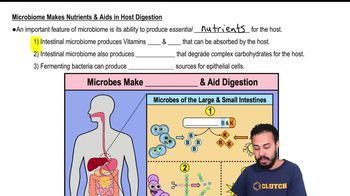Classify each of the molecules on the left as an acid, base, or salt. The dissociation products of the molecules are shown to help you.
NaOH → Na⁺ + OH⁻
 Verified step by step guidance
Verified step by step guidance



Classify each of the molecules on the left as an acid, base, or salt. The dissociation products of the molecules are shown to help you.
NaOH → Na⁺ + OH⁻
DRAW IT Draw a simple lipid, and show how it could be modified to a phospholipid.
Macronutrients (needed in relatively large amounts) are often listed as CHONPS. What does each of these letters indicate, and why are they needed by the cell?
Briefly describe the components of DNA, and explain its functional relationship to RNA and protein.
Identify and mark each of the following on the portion of DNA undergoing replication: replication fork, DNA polymerase, RNA primer, parent strands, leading strand, lagging strand, the direction of replication on each strand, and the 5′ end of each strand. <IMAGE>
Match the following examples of mutagens. <IMAGE>